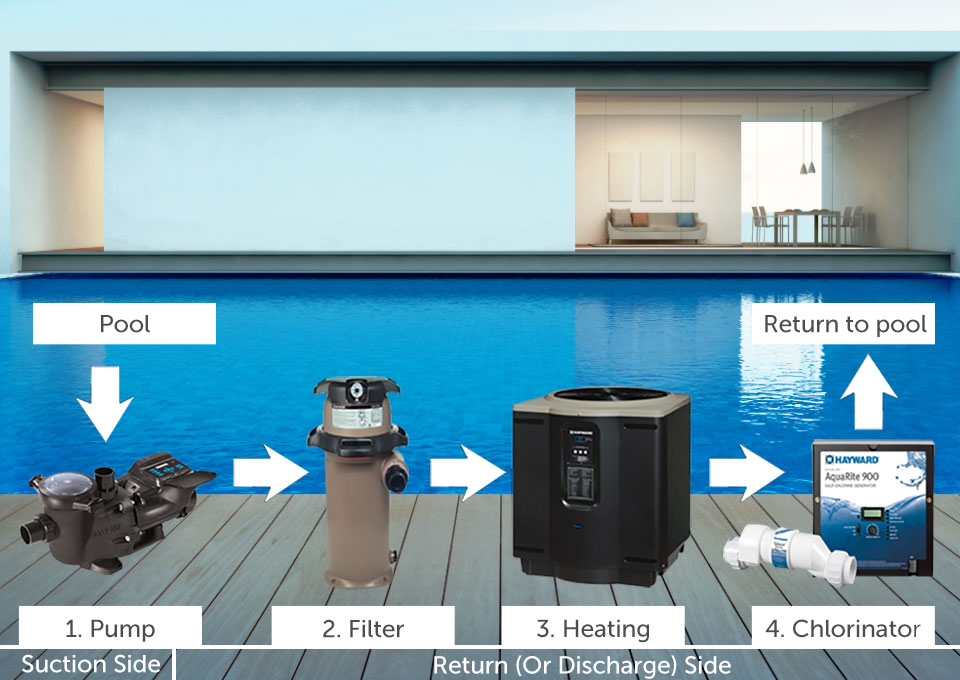How A Pool Works
How a Pool Works
Pool circulation systems work much like the body’s circulatory system. Water is drawn from your pool by the powerful suction created from the pump.
- The pump draws the water through the skimmers and drains, removing large debris during the journey.
- When the pump’s impeller is reached, pressure forces water through the filer, catching any debris not caught by skimmer baskets.
- Water is treated and heated before it is returned to the pool.
With so many moving parts, maintenance is key to keeping your pool circulation system at optimal performance.

Water is drawn from your pool from the suction created by the pump. The pump generates pressure and returns the water to the pool, passing through the filter, then the heater, and the chlorinator.
How Pool Pumps Work
The pool pump is the heart of the circulation system, as it creates the flow of water that allows chemicals to circulate evenly through the pool, sanitizing it effectively and moving debris through the circulation system and out of the pool. In-ground pool owners can choose between variable and single-speed pool pumps. Key differences include:
- Speed — Single speed pool pumps run at one fixed speed, while variable speed pool pumps are programmable. They can be run at a wide variety of speeds depending on the particular needs of your pool and your desire to save on energy costs.
- Energy Savings — Variable speed pool pumps can save you up to 90% of the annual energy costs of a single speed pump.
- Automation — Variable speed pool pumps can be integrated into advanced automation systems, allowing you to set timers to run the pump at different speeds at different times of the day.
How Pool Filters Work
The pool filter is a piece of equipment developed with the sole purpose of filtering dirt particles out of the pool circulation system. The filter plays an important role in keeping pool water clean of the smallest debris. There are three main filter types available:
- Diatomaceous Earth (D.E.) Filters
- Sand Filters
- Cartridge Filters
Diatomaceous Earth (D.E.) Filters — Filter particles down to 3-5 microns, D.E. filters should be backwashed when the pressure gauge reads 8-10 psi.
Sand Filters — Capture particles down to 20-40 microns, sand filters should be backwashed when the pressure gauge reads 8-10 psi. These filters require the least maintenance, and can go 5 years without needing the sand replaced.
Cartridge Filters — Capture particles down to 10-20 microns, cartridge filters do not require backwashing. These filters allow you to save water and provide the support required to run an energy efficient pool.
How Pool Pumps Work
The final piece of equipment that water passes through before making its way back into the pool, the heater warms the water to a pre-set temperature, allowing pool owners to take advantage of the fun of a pool even if the weather is cool or they have a shady backyard.
There are three main options to consider when it comes to a pool heater.
- Propane
- Natural Gas
- Electric
Gas heaters are typically more cost efficient than electric heaters. Natural gas requires you to set down pipes, but it burns cleaner and is more environmentally friendly than alternatives.
Propane heaters require either a small tank that will need to be refilled regularly, or a larger tank that needs to be installed and refilled professionally.
There are many different factors to consider when creating your pool circulation system
- Maintenance of proper chemical balance
- Prevention and removal of bacteria, algae, and other microbial
- Prevention of dead spots
- Increased sanitation efficiency
With the right equipment, you can improve your system functionality and the cleanliness of your pool in no time.
CALL OR COME IN TODAY!
Artesian Pools & Spas Inc.
3191 Columbia Blvd.
Bloomsburg, PA 17815
Phone: (570) 784-8955
Get Directions
Mon-Fri: 9:00am-5:00pm
Saturday: 9:00am-4:00pm
Sunday: Closed
Artesian Hot Tubs, Saunas, & Swim Spas
1035 Shoppes Blvd.
Suite 2131
Moosic, PA 18507
Phone: (570) 456-5010
Mon-Fri: 9:00am-5:00pm
Saturday: 9:00am-4:00pm
Sunday: Closed